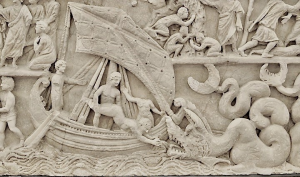HOMILY LENT WEEK 01 03 – Year I
A Pattern for Transformation
(Jonah 3:1-10; Ps 51; Luke 11:29-32)
***************************************
“No sign will be given to this generation except the sign of Jonah.”
These are the enigmatic words of Jesus in the gospel today. What are we to make of them? What is this sign of Jonah? What relevance does this have to us?
May I suggest great relevance? These words invite us to believe in Jesus and follow him by living the pattern for transformation he gave us – the Paschal Mystery.
 The fable about Jonah in the Old Testament to which Jesus compares himself is a powerful imaginative story. Amazingly, way back in history, the author of that story was inspired to record it, probably unknowingly, as a preparation for the Israelites to be open to the new life Jesus would offer them through his experience of passion, death and resurrection.
The fable about Jonah in the Old Testament to which Jesus compares himself is a powerful imaginative story. Amazingly, way back in history, the author of that story was inspired to record it, probably unknowingly, as a preparation for the Israelites to be open to the new life Jesus would offer them through his experience of passion, death and resurrection.
This story is a metaphor comparable to the incident in the desert where God instructed Moses to put a bronze serpent (free of poison) on a standard, get the people to look at it and they would live. That too is a powerful Old Testament prefiguring of that pattern of Jesus (free of sin) – his death on a cross freeing humanity from its bondage to sin and sinfulness.
The key to this experience of new eternal life through the Paschal Mystery is the word “repentance”, found in all three readings today. In the first reading, the people of Nineveh repented in sackcloth and ashes; the psalm speaks of a broken and contrite heart, and in the gospel, Jesus repeats that the people of Nineveh repented at the proclamation of Jonah.
The word “repent” in Greek is “metanoia,” which literally means putting on our highest mind, changing our way of thinking, feeling and behaving. This links with the two-fold mission of Jesus as Messiah: to redeem and sanctify, to forgive and to heal.
Psalm 51 picks up on this theme. “Wash me thoroughly from my iniquity and cleanse me from my sin” speaks of forgiveness. Living the Paschal Mystery first of all means coming to Jesus for the forgiveness that he offers us.
The psalm then continues: “Create in me a clean heart, O God, and put a new and steadfast spirit within me.” This speaks of the healing that only God can accomplish within us. Living the Paschal Mystery also means being open to this healing.
So, we need to be both forgiven of our sins (the wrong that we do), and healed of our sinfulness (that which makes us do wrong). That process involves the pain of naming our dark side, willingness to let it go, die to it, and rise to a new life. We are to name it, claim it, not blame it, tame it, and we can aim it!
This process is never ending. It becomes a Spiritual Spiral of transformation, healing and growth – Passion, Death and Resurrection. Each time we become aware of some sin that begs for forgiveness, some painful emotion, negative attitude or addiction that cries out for healing, we are invited to enter into that mysterious pattern of forgiveness and healing that Jesus offered us.
One way that we can put it is: “We are to be the best person God wants us to be; allow God to do within us whatever God wants to do within us, and then do what God wants us to do.”
The Eucharist is the spiritual food that Jesus offered us for that journey, on the eve of his own passion, death and resurrection.
May our celebration today strengthen our faith to follow Jesus through our own experience of that spiritual spiral of passion, death and resurrection into new life.



